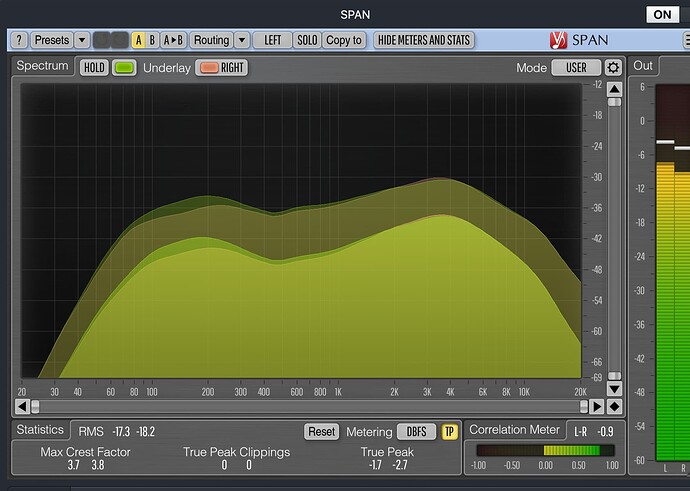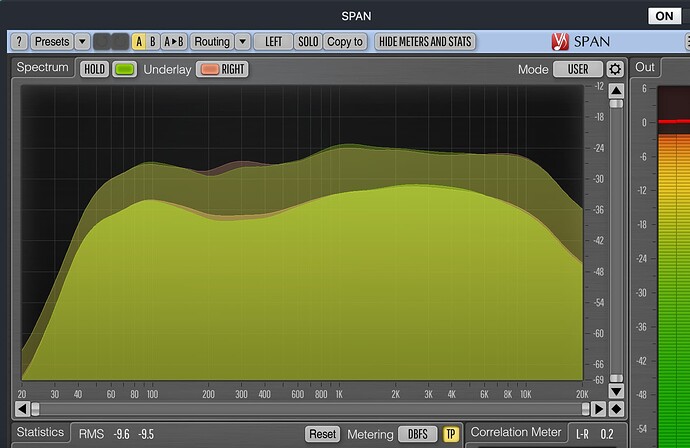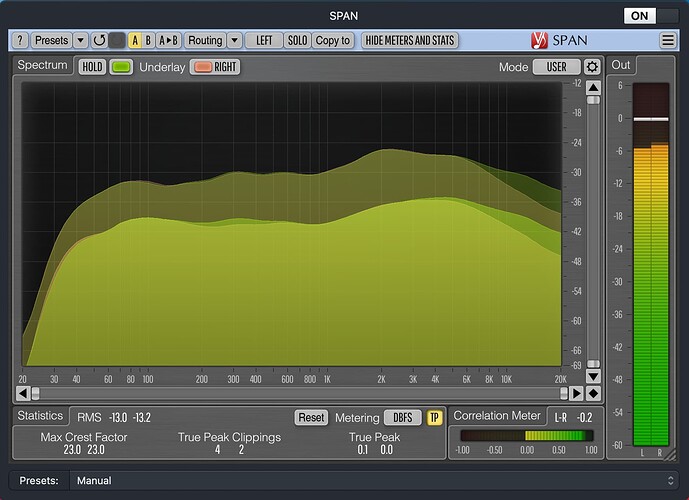Here’s a cool cover of “Lights Out” by UFO
that I mixed recently over at AMC:
The mix is loud, but still has great dynamics. You really nailed the instrument separation.
Great cover. I see why he’s called Guitar Jeff, the whole band is tight.
First few seconds i yelled out “aerial combat”…oh yeah) Wish I could get that guitar tone. Great singer/ riffs/ makes me feel inadequate for sure. Kinda a foreigner sound to me. The guy strains on the high notes but it comes off great. Nice isolation…congrats Andy.
Hey,
I started to listen and my 1st impression was to check out the original which I have never heard. I watched a live video and a not live video and both had much more prominent bass from yours.
I do like your efforts more and that of the recorded act whomever that may hap be but, yeah, don’t much enjoy the actual song itself.
chips & cheerios
dev
This is an awesome recording.
The guitar track is so nice, especially the solo parts.
I love the vocals. Sounds like a pro, a true rocker!!!
Thanks for this recording.
Rene
That’s quite a “blast from the past”! UFO was quite big in the AOR days of the late 70’s, they had several ‘hit’ type records on the Rock stations. Michael Schenker (guitar) was awesome, bouncing between UFO and Scorpions, and later going solo. Phil Mogg was a master of those vocals, but this guy gives quite a good performance. I agree with Paul that there’s a weird character on the guy’s vocals, especially the high notes. He probably hits them, but it does sound like he’s straining a bit at times. Did you have to do any vocal tuning on that performance? The instrumentals seems like they’re pretty spot-on.
Devyn mentioned the bass, and while it sounds okay here, and I assume it’s what you had to work with, back in the day bass guitar was sometimes much more prominent than it is (or gets mixed) in ‘modern’ music styles today. I enjoy the retro style from back then. And the darker color (“warmth”) of the analog recordings many times as well.
From what I can tell, it’s some really good tracks and a great mix from you.
Thanks, yeah it’s loud, but not stupid loud. The final limiter is only doing 1dB of GR on this track. The way I mix these days, the loudness is “built in” using the methods I described here.
Yeah, he’s an amazing player. The drums and bass are actually virtual instruments.
Thanks JayGee
You’re right, he does sound a little like Lou Gramm on the higher notes. I don’t mind his voice - I kind of like to hear people reaching for the notes - it adds intensity IMO. I think I could have done a better job of mixing his vocals - there’s a bit of a resonance up high that bothers me a bit, but not enough to go chasing it.
Thanks Anthony. I’m not a big fan of the song itself. I think this song is a little weak in it’s arrangement TBH. That’s why I added the harmonies in the chorus. Although I love the guitar playing, the song is “full on” all the way through, and the guitar solos kind of run out of interesting things to say by the end. Nevertheless, the cover that Jeff has done is pretty much a bang-on copy of the studio track.
Thanks Rene - I can’t take any credit for the recording or playing - that was all Jeff. Glad you enjoyed it.
Hey Stan, yes I was familiar with the name UFO, but they never made an impact over here in Oz at the time. This was the era that was the absolute pinnacle of our live rock scene. We had so much awesome home-grown music that a lot of oversees acts never made a dent.
Nope
As I said above, only the guitars and vocals are live instruments - Drums and bass are VSTi
You are correct that older recordings had something we perceive as “warmth”. They simply couldn’t reproduce as much top end. There was a physical limitation imposed first by tape, and later in the process by vinyl records.
Strictly speaking, I think it is a bit of a misnomer to say older stuff had more bass. It didn’t, because it couldn’t - If you put too much bass on a vinyl record, the needle would jump out of the groove. On the other hand, there is absolutely no physical limitation on how much bass you can put on a digital recording.
Taking the original recording of this song is a case in point.
The perception of more bass is actually caused by how thin the guitars and vocals are mixed in the midrange. Notice how there is a significant dip in the frequency spread from around 250hz to 1.5k, centred around 500hz
The “meat” of the electric guitars live at around 150hz to around 1k, but that has been all sucked out here to give the mix more apparent clarity and allow the bass and kick to “live” higher in the frequency spectrum.
The “bass” is actually centred around 180hz, which is more the first harmonic of the bass fundamental than true bass. It’s a similar story with the kick - fundamental is probably around 50-60hz, but the “kick” here is showing up mainly at the first harmonic - 100-120hz… and it all rolls off to nothing at about 35hz. And then the “warmth” is mainly due to the sudden roll off from around 12k up to 20k
On the other hand, there is a significant frequency “bump” from 1.5k-7k, centred at around 4k. This helps the guitar and vocals cut through and balances the low end
Listen carefully to the mix and you’ll hear what I mean:
On the other hand, take the frequency spectrum of a modern mix - This is the response of Disturbed’s “Hey You”:
Notice the much fuller extension below 100hz? Still a lot of upper bass too, but much more information in the low mids and midrange. A generally “flatter” frequency response from the very low to the very high.
My approach to the mix was to go for similar drums to the original, but with a more full range frequency response in the low and high end, so it would fit into a modern playlist without sounding too dated. Here’s a frequency graph of my mix to compare:
Thanks!
The loudness is exactly what was needed for the song, it caught me by surprise when I hit play with my headphones on because I had the volume turned up for a quieter mix.
Jeff did a good job programming the bass and drums, they passed the Turning test.
I have purchased most of your music and when your songs come up when playing on shuffle mode, the mixes sound professional and just blend in with the flow.
Jeff did a good job programming the bass and drums, they passed the Turning test.
Out of curiosity, what’s the “Turning test”?
I have purchased most of your music and when your songs come up when playing on shuffle mode, the mixes sound professional and just blend in with the flow.
That’s great to know… I think my mixes have improved since then, so hopefully the next album will sound even better… Oh, thanks so much for your support -I really appreciate it! ![]()
I was familiar with the name UFO, but they never made an impact over here in Oz at the time.
They were on the bill with Rush, my first big Rock concert at a rather young age. They’re part of my musical genealogy, though they had kind of faded into the cobwebs until you posted this. Doctor Doctor, Rock Bottom, Only You Can Rock Me, a few others I think.
Strictly speaking, I think it is a bit of a misnomer to say older stuff had more bass. It didn’t, because it couldn’t - If you put too much bass on a vinyl record, the needle would jump out of the groove. On the other hand, there is absolutely no physical limitation on how much bass you can put on a digital recording.
Yeah, I don’t know how to describe it accurately, though you gave a great analysis of it. It’s not necessarily “more bass” or “louder bass”, but that in some bands and songs back then the bass seemed “more prominent” or “more articulated”.
I might chalk it up to parametric EQ on mixing boards, though of course analog tape and recording techniques probably played a role too. I actually learned to EQ on hardware mixing boards before really doing much with it in digital, and while there are many similarities, the hardware gives you limited options. You just dial it in until it sounds right, and that’s usually it. Sweeping technique works there too, but you don’t have the visual element. It’s all ears.
BTW - are these tracks available somewhere besides a mix contest? I don’t see them on the Cambridge site.
No, only on AMC - it’s a privately run site - costs $10 per month to join.
Out of curiosity, what’s the “Turning test”?
It’s a test to see if a person can tell if they’re talking to a human or a computer.
I just applied here to music, since I thought it was a human playing bass and drums.
Big UFO and Michael Schenker fan here. I like the mix quite a lot… hot and in your face the way it should be. My only criticism is with the rhythm guitars (not the mix, the performance.) The guy plays well but those rhythm guitars are sterile and choppy… too ‘on the money’ with no accents. He’s got to let it breathe a little more. Listen back to the original and it’s much more organic and alive.
Turing Test… after Alan Turing. “The phrase ‘The Turing Test’ is most properly used to refer to a proposal made by Turing as a way of dealing with the question whether machines can think.”
Thanks Jameson…Glad you like the mix… As for the guitars, what can I say? I don’t think I’m in any position to judge his rhythm playing, as I could only ever hope in a million years to play as blazingly fast and accurate as he can when he plays lead!.. I think I get what you mean, though - I did reference the original as I was mixing.
Turing Test… after Alan Turing. “The phrase ‘The Turing Test’ is most properly used to refer to a proposal made by Turing as a way of dealing with the question whether machines can think.”
Ah! Now that makes total sense! - I think it was mistakenly written as “Turning Test”… probably auto-incorrect is the culprit again!
Turing Test… after Alan Turing. “The phrase ‘The Turing Test’ is most properly used to refer to a proposal made by Turing as a way of dealing with the question whether machines can think.”
Ha ! - I had written it as Turning test. Thanks for correcting me.



